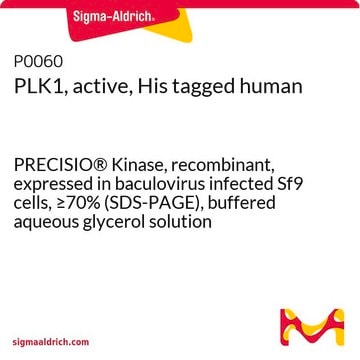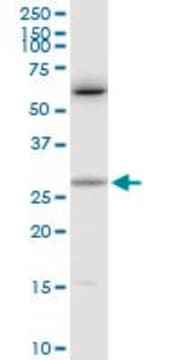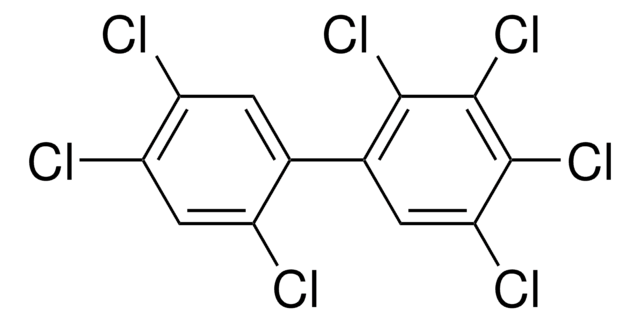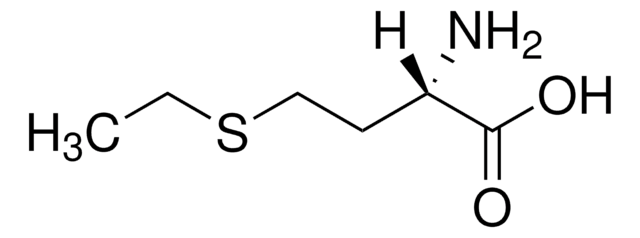SRP0360
PLK1 Polo Box Domain active human
recombinant, expressed in E. coli, ≥90% (SDS-PAGE)
Synonym(s):
STPK13, polo-like kinase 1
Sign Into View Organizational & Contract Pricing
All Photos(1)
About This Item
UNSPSC Code:
12352200
NACRES:
NA.32
Recommended Products
biological source
human
recombinant
expressed in E. coli
Assay
≥90% (SDS-PAGE)
form
aqueous solution
mol wt
53 kDa
packaging
pkg of 100 μg
storage condition
avoid repeated freeze/thaw cycles
concentration
2.9 mg/mL
NCBI accession no.
UniProt accession no.
shipped in
dry ice
storage temp.
−70°C
Gene Information
human ... PLK1(5347)
General description
Human Plk1 polo box domain (GenBank Accession No. NM_005030), amino acids 367-end with N-terminal GST-tag, MW=53 kDa, expressed in an E. coli expression system.
Polo-like kinase 1 (PLK1) belongs to the PLK family. It comprises polo-box domain (PBD). PBD, in turn, contains polo boxes (PB1 and PB2) with a 6-stranded β sandwich and an α helix as structural elements. The PLK1 gene is mapped to human chromosome 16p12.2.
Application
PLK1 Polo Box Domain active human has been used in the in vitro binding assay with various synthetic peptides coupled to streptavidin beads. It has also been used in binding studies with fluorescein-labeled substrate peptide 5-carboxyfluorescein-GPMQSpTPLNG to test the effect of various inhibitors.
Biochem/physiol Actions
Polo-like kinase 1 (PLK1) is a mitotic kinase that mediates the regulation of various events in mitosis including chromosome segregation, cytokinesis, centrosome maturation, and separation. It activates cell division cycle 25 (CDC25) phosphatase which further regulates mitotic entry. Elevated expression of PLK1 is observed in many tumors.
Storage Class Code
10 - Combustible liquids
WGK
WGK 2
Flash Point(F)
Not applicable
Flash Point(C)
Not applicable
Choose from one of the most recent versions:
Certificates of Analysis (COA)
Lot/Batch Number
Don't see the Right Version?
If you require a particular version, you can look up a specific certificate by the Lot or Batch number.
Already Own This Product?
Find documentation for the products that you have recently purchased in the Document Library.
Sugunadevi Sakkiah et al.
PloS one, 9(7), e101405-e101405 (2014-07-19)
The polo-like kinase 1 (Plk1) is a critical regulator of cell division that is overexpressed in many types of tumors. Thus, a strategy in the treatment of cancer has been to target the kinase activity (ATPase domain) or substrate-binding domain
Sara Abdelfatah et al.
Journal of advanced research, 16, 145-156 (2019-03-23)
Polo-like kinase 1 (PLK1), a member of the Polo-like kinase family, plays an important regulatory role in mitosis and cell cycle progression. PLK1 overexpression is correlated with tumourigenesis and poor prognosis in cancer patients. Therefore, the identification of novel compounds
Zsofia A Novak et al.
Developmental cell, 37(6), 545-557 (2016-06-22)
Centrosomes and cilia are organized by a centriole pair comprising an older mother and a younger daughter. Centriole numbers are tightly regulated, and daughter centrioles (which assemble in S phase) cannot themselves duplicate or organize centrosomes until they have passed
S-L Zhou et al.
European review for medical and pharmacological sciences, 23(5), 2084-2091 (2019-03-28)
Our study aimed to explore the effects of miRNA-296-5p on the biological behaviors of papillary thyroid carcinoma (PTC) cells and its potential mechanism. Twenty-eight PTC tissues and the corresponding non-cancerous tissues were collected. Real Time-quantitative Polymerase Chain Reaction (RT-qPCR) analysis
Pooja Sharma et al.
Scientific reports, 9(1), 15930-15930 (2019-11-07)
The human polo-like kinase PLK1 coordinates mitotic chromosome segregation by phosphorylating multiple chromatin- and kinetochore-binding proteins. How PLK1 activity is directed to specific substrates via phosphopeptide recognition by its carboxyl-terminal polo-box domain (PBD) is poorly understood. Here, we combine molecular
Our team of scientists has experience in all areas of research including Life Science, Material Science, Chemical Synthesis, Chromatography, Analytical and many others.
Contact Technical Service








